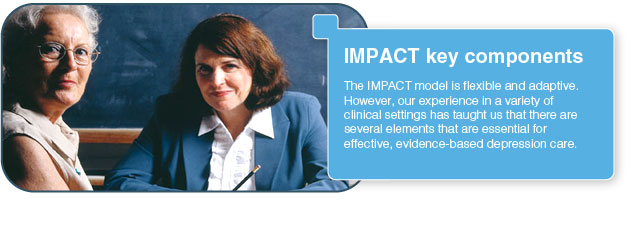
|
about home depression IMPACT key components IMPACT research evidence IMPACT endorsements |
 |

Five of the most essential elements are:
1. Collaborative care is the cornerstone of the IMPACT model and functions in two main ways:
- The patient's primary care physician works with a care manager to develop and implement a treatment plan (medications and/or brief, evidence-based psychotherapy)
- Care manager and primary care provider consult with psychiatrist to change treatment plans if patients do not improve
2. Depression Care Manager:
This may be a nurse, social worker or psychologist and may be supported by a medical assistant or other paraprofessional. The care manager:
- Educates the patient about depression
- Supports antidepressant therapy prescribed by the patient's primary care provider if appropriate
- Coaches patients in behavioral activation and pleasant events scheduling
- Offer a brief (six-eight session) course of counseling, such as Problem-Solving Treatment in Primary Care
- Monitors depression symptoms for treatment response
- Completes a relapse prevention plan with each patient who has improved
3. Designated Psychiatrist:
- Consults to the care manager and primary care physician on the care of patients who do not respond to treatments as expected
4. Outcome measurement:
- IMPACT care managers measure depressive symptoms at the start of a patient's treatment and regularly thereafter. We recommend the PHQ-9 as an effective measurement tool, however, there are other effective tools.
5. Stepped care:
- Treatment adjusted based on clinical outcomes and according to an evidence-based algorithm
- Aim for a 50 percent reduction in symptoms within 10-12 weeks
- If patient is not significantly improved at 10-12 weeks after the start of a treatment plan, change the plan. The change can be an increase in medication dosage, a change to a different medication, addition of psychotherapy, a combination of medication and psychotherapy, or other treatments suggested by the team psychiatrist.
| Privacy Policy | Links |